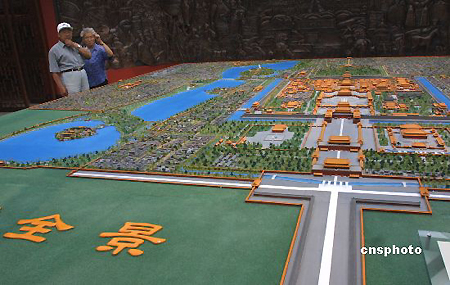Imperial city wall to show up in Beijing
(chinanews.cn)
Updated: 2006-07-09 10:03 Renovation of the Imperial City wall located in
Di'anmen in the Xicheng district in Beijing will be completed soon, by then the
wall will show up again after remaining falling into obscurity for nearly 70
years. Construction workers are currently giving the finishing touches to the
wall.

The sand table showing
the general view of Imperial
City.[cnsphoto/filephoto] |
The Di¡¯anmen Avenue measures 550 meters in total length. The wall stretching
from east to west on the street side was first built in 1420, the 18 reign year
of the Yongle Emperor in the Ming Dynasty.
Since then, it had been renovated several times. The present wall existing
today was built in the Qing Dynasty. It is a heritage site under protection by
the Beijing municipal government.
The Di¡¯anmennei Avenue used to be the main street in the old Imperial City.
It was also the axis line in the northern part of the old Beijing city.
In the Ming Dynasty, lots of imperial material supply managing organs were
built on both sides of the street, and most of the people living there worked
for the imperial household.
In the early Qing Dynasty, most of these organs were no longer in use. So the
royal servants became craftsmen. These people and their descendants later built
numerous houses and shops in the neighborhood, changing the street out of
recognition.
In the Republic of China period, the wall was gradually submerged in
buildings and vanished from people¡¯s sight.
At present, the section of the wall relic in the eastern part of the Di¡¯anmen
Avenue measures 240.2 meters and the one in the western part measures 122.4
meters.
Since the wall hadn¡¯t been repaired for a long time, most part was seriously
damaged. The wall was cracked and eroded, and the surface of the wall was
peeling from the body.
In several places, the wall had nearly collapsed. There were even trees
growing through the wall. The yellow glazed tiles and decorative mythical
animals on the top of the wall were no more.
In order to restore it, the Xicheng district authority invested 250 million
yuan last year to tear down the shops and relocate the residents.
|